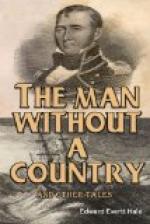and all the others, rung out with order or without order, breaking the hush directly as the horses’ bells were stilled, thrown into the air with all the gladness of childhood, selected sometimes as Harry happened to think best for the hearers, but more often as the jubilant and uncontrolled enthusiasm of the children bade them break out in the most joyous, least studied, and purely lyrical of all. O, we went to twenty places that night, I suppose! We went to the grandest places in Boston, and we went to the meanest. Everywhere they wished us a merry Christmas, and we them. Everywhere a little crowd gathered round us, and then we dashed away far enough to gather quite another crowd; and then back, perhaps, not sorry to double on our steps if need were, and leaving every crowd with a happy thought of
“The star, the manger, and the Child!”
At nine we brought up at my house, D Street, three doors from the corner, and the children picked their very best for Polly and my six little girls to hear, and then for the first time we let them jump out and run in. Polly had some hot oysters for them, so that the frolic was crowned with a treat. There was a Christmas cake cut into sixteen pieces, which they took home to dream upon; and then hoods and muffs on again, and by ten o’clock, or a little after, we had all the girls and all the little ones at their homes. Four of the big boys, our two flankers and Harry’s right and left hand men, begged that they might stay till the last moment. They could walk back from the stable, and “rather walk than not, indeed.” To which we assented, having gained parental permission, as we left younger sisters in their respective homes.
II.
Lycidas and I both thought, as we went into these modest houses, to leave the children, to say they had been good and to wish a “Merry Christmas” ourselves to fathers, mothers, and to guardian aunts, that the welcome of those homes was perhaps the best part of it all. Here was the great stout sailor-boy whom we had not seen since he came back from sea. He was a mere child when he left our school years on years ago, for the East, on board Perry’s vessel, and had been round the world. Here was brave Mrs. Masury. I had not seen her since her mother died. “Indeed, Mr. Ingham, I got so used to watching then, that I cannot sleep well yet o’ nights; I wish you knew some poor creature that wanted me to-night, if it were only in memory of Bethlehem.” “You take a deal of trouble for the children,” said Campbell, as he crushed my hand in his; “but you know they love you, and you know I would do as much for you and yours,”—which I knew was true. “What can I send to your children?” said Dalton, who was finishing sword-blades. (Ill wind was Fort Sumter, but it blew good to poor Dalton, whom it set up in the world with his sword-factory.) “Here’s an old-fashioned tape-measure for the girl, and a Sheffield wimble for the boy. What, there is no boy? Let one of the girls have it then; it will count one more present for her.” And so he pressed his brown-paper parcel into my hand. From every house, though it were the humblest, a word of love, as sweet, in truth, as if we could have heard the voice of angels singing in the sky.




